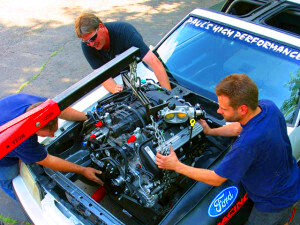Understanding Engine Swap Laws in Arizona
If you’re a car lover in Arizona you may have come across the concept of engine swaps. These modifications go beyond boosting your vehicles performance; they also allow you to add your personal touch and enrich your driving experience. However before jumping into the realm of engine swaps it’s essential to familiarize yourself with the legal aspects. Arizona has laws and regulations in place regarding these modifications to ensure safety and adherence to environmental standards. Let’s delve into the key points you should be aware of to navigate these regulations smoothly and enjoy your engine swap journey without any legal complications.
Why Engine Swaps Are Popular Among Car Enthusiasts
Car enthusiasts love engine swaps for a bunch of reasons. I still recall the excitement of giving my old car a makeover that made it feel fresh and new. Here are a few reasons why engine swaps bring so much joy.
- Performance Boost: One of the main reasons people swap engines is to enhance performance. Upgrading to a more powerful engine can significantly improve acceleration and overall driving experience.
- Customization: An engine swap allows you to tailor your vehicle to your exact specifications. Whether it’s for increased power or fuel efficiency, customization is a major draw.
- Reviving Old Vehicles: Engine swaps can breathe new life into older cars that might otherwise be considered outdated or obsolete. It’s like giving your beloved classic a second chance on the road.
- Learning Experience: For many, the process of swapping engines is a valuable learning experience. It provides hands-on knowledge about automotive mechanics and engineering.
After experiencing a few engine swaps I can assure you that while the process may be tough it brings immense satisfaction. There’s a profound sense of joy in hearing a fresh engine come to life and knowing that you played a role in making it happen.
Key Legal Considerations for Engine Swaps
When considering engine swaps in Arizona it’s crucial to grasp the legal landscape. The states regulations aim to ensure that modifications uphold vehicle safety and environmental standards. Here are some important factors to keep in mind.
- Registration and Documentation: Ensure you have all necessary documentation for the new engine. This includes the engine’s VIN and any certificates of authenticity. Proper paperwork is crucial for updating your vehicle’s registration.
- Emissions Compliance: Arizona has strict emissions regulations. Make sure that the new engine complies with state emissions standards. You may need to get a new emissions test or certification for your vehicle.
- Safety Standards: The new engine must be compatible with your vehicle’s safety features. Check that all safety systems, like airbags and brakes, are functioning correctly after the swap.
- Insurance: Inform your insurance provider about the engine swap. Your policy may need adjustments to cover the new engine’s value and performance capabilities.
In my view having a skilled mechanic by your side and keeping yourself updated on the newest rules can make it easier to handle the legal side of things when it comes to engine swaps. While it may require some additional work, it guarantees that your engine replacement is a beneficial and law abiding improvement for your car.
Requirements for Engine Swaps in Arizona
If you’re thinking about swapping an engine in Arizona it’s essential to be aware of the specific regulations to make sure everything is in compliance. Having navigated this process before I can attest that it may appear overwhelming at first. However with the guidance it becomes more feasible. Here are some key points to remember:
- Engine Compatibility: The new engine must be compatible with your vehicle’s existing components. This includes everything from the transmission to the engine mounts. A mismatch can lead to a host of problems, so it’s best to consult a professional.
- Documentation: Proper documentation is a must. You need to keep records of the engine’s specifications, previous usage, and any modifications. This paperwork will be required when updating your vehicle’s registration.
- Mechanical Inspection: Before you complete the swap, ensure a certified mechanic inspects the installation. This step ensures that everything is installed correctly and operates smoothly.
- Registration Update: Once the swap is complete, you’ll need to update your vehicle registration. This involves submitting a new title and possibly a re-inspection report to the Arizona Department of Transportation.
From my perspective following these guidelines has made things easier and more manageable. It may involve some effort upfront but it helps prevent any unforeseen issues with your engine replacement in the future.
Emissions and Safety Regulations to Keep in Mind
Arizona is famous for its stringent emissions and safety rules and the same goes for engine swaps. Adhering to these regulations is not solely about following the law; it’s also about making sure your vehicle stays safe and eco conscious. Let’s take a deeper dive into this topic.
- Emissions Standards: The engine you choose must meet Arizona’s emissions standards. This usually means it needs to be of a similar age or newer than the vehicle. An emissions test may be required to verify compliance.
- Safety Equipment: Ensure that all safety equipment—such as airbags, seatbelts, and brake systems—is compatible with the new engine. Any modifications should not interfere with these critical components.
- Inspection Requirements: After an engine swap, your vehicle might need a thorough inspection to ensure it adheres to all safety and emissions standards. This is particularly important if the swap involves significant modifications.
- Documentation of Compliance: Keep detailed records of how your new engine meets emissions and safety standards. This documentation can be crucial in case of any legal or inspection-related issues.
Based on what I’ve seen sticking to these rules can save you a lot of trouble down the line. Keeping yourself updated on legal changes and seeking advice from professionals when unsure is always wise.
Steps to Ensure Your Engine Swap is Legal
Making sure your engine swap is above board is crucial to steer clear of any problems with your cars registration and functionality. Having gone through this process personally I can offer you some tips to keep you on the path.
- Consult with a Professional: Before you begin, talk to a mechanic or automotive professional who understands Arizona’s engine swap regulations. Their expertise can help you avoid common pitfalls.
- Verify Engine Specifications: Make sure that the engine you are installing meets all required specifications for your vehicle, including emissions and safety standards. This might involve some research or consultation with experts.
- Complete Necessary Paperwork: Gather and organize all required documentation, including engine specifications and installation records. Submit this paperwork to the relevant authorities to update your vehicle’s registration.
- Schedule Inspections: Arrange for any required inspections to ensure that the engine swap complies with safety and emissions regulations. This might include a mechanical inspection and an emissions test.
- Update Insurance: Notify your insurance company about the engine swap. Adjust your policy to cover the new engine and any changes in performance or value.
During my engine swap experience these steps proved to be essential for a seamless process. While it may appear to be a task investing in these precautions will ultimately save you time and hassle down the road.
Common Pitfalls to Avoid During an Engine Swap
As someone who has tried my hand at swapping engines I know how thrilling yet tricky the process can be. There are a few obstacles that can transform an exciting project into a frustrating experience. Let me give you an overview of some common challenges to keep an eye out for.
- Ignoring Compatibility: One of the biggest mistakes is not checking if the new engine is compatible with your vehicle’s existing components. An engine swap isn’t just about fitting the new engine into the space; it also involves ensuring that it integrates well with the transmission, exhaust system, and electrical components. I once encountered a problem where the new engine didn’t align properly with the mounts, leading to a lot of rework.
- Overlooking Wiring and Electronics: Modern engines come with complex wiring and electronic systems. A common error is underestimating the amount of work needed to connect these systems correctly. Missing out on this can lead to malfunctioning sensors or even a non-starting engine. Take it from me, carefully mapping out the wiring before starting can save a lot of headaches.
- Neglecting Emissions Standards: As mentioned earlier, emissions compliance is crucial. Ensure the new engine meets Arizona’s emissions standards to avoid legal and environmental issues. Skipping this step might result in failing emissions tests and facing hefty fines.
- Rushing the Installation: Engine swaps are intricate and require patience. Rushing through the installation can lead to overlooked details and potential safety issues. My advice? Take your time to ensure every bolt is tightened, every wire is connected, and every system is tested.
- Failing to Update Paperwork: After completing the swap, remember to update your vehicle’s registration and inform your insurance provider. Ignoring this can lead to complications with your vehicle’s legality on the road.
Gaining insights from these missteps has led to smoother and more enjoyable engine swaps for me. Each blunder presents a chance to grow and tackling these challenges in advance can have a significant impact.
Resources for Further Information and Assistance
Changing out an engine can be a tricky job, but luckily there are many resources out there to help you navigate the process. Here are a few useful sources of information and support that I’ve come across.
- Automotive Forums: Websites like CarGurus and CivicX offer a wealth of knowledge and personal experiences from fellow car enthusiasts who have tackled similar projects.
- Local Mechanics and Workshops: Consulting with experienced mechanics who specialize in engine swaps can provide invaluable hands-on advice. I’ve found that local workshops are often willing to share their expertise or recommend reliable services.
- Online Guides and Tutorials: Websites like Hagerty offer detailed guides and video tutorials. These can be particularly useful for visualizing the steps involved in the swap.
- Automotive Parts Suppliers: Reputable suppliers like Summit Racing or JEGS provide not only parts but also technical support and advice on compatibility and installation.
- Government and DMV Resources: Check the Arizona Department of Transportation’s website for up-to-date information on legal requirements and registration procedures. This can help ensure that you meet all regulatory standards.
Having these tools and materials on hand can greatly simplify and enhance the experience of swapping engines. Each resource provides a valuable insight that can assist you in steering clear of challenges and ensuring a smooth transition.
FAQ
What are the first steps in planning an engine swap?
Begin by looking into how well the new engine works with your car. Check if it fits properly and if all parts like the transmission and wiring are compatible. Talk to a mechanic or car expert to come up with a thorough plan.
How do I ensure my engine swap meets emissions standards?
Make sure the engine meets Arizona’s emissions standards. You may have to conduct an emissions test or get a certification to confirm that it’s compliant. It’s important to verify this before finalizing the engine replacement.
What documentation is required for an engine swap?
Be sure to gather the necessary paperwork for the engine such as its VIN and details. Once the replacement is done remember to refresh your vehicles registration with the Arizona Department of Transportation. Additionally make sure to maintain a record of all changes and inspections made.
How can I find a reputable mechanic for my engine swap?
Seek advice from fellow car lovers, browse through online ratings and reach out to nearby auto repair shops. A trustworthy mechanic should have a background in engine swaps and be willing to share references or showcase their past projects.
What should I do if I encounter issues with my engine swap?
If you encounter any issues seek advice from your mechanic right away. Additionally you can check out forums and resources for helpful troubleshooting suggestions. Dealing with problems early on can help avoid more serious complications later on.
Conclusion
When it comes to swapping an engine it’s not just about the mechanics involved; it’s also an adventure packed with thrill, knowledge and a dash of navigating through rules. From making sure everything fits well and complying with emissions standards to steering clear of hurdles and tapping into helpful resources every part of the journey matters. My personal encounters with engine swaps have shown me how crucial careful preparation and extensive research are. Although it may seem overwhelming at first with guidance and assistance you can turn your vehicle into something truly remarkable while staying within the limits. Embrace the process, be patient and savor every moment of the ride!


